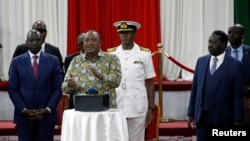A Kenyan task force has recommended sweeping governmental changes, including restoring the post of prime minister, establishing a mixed cabinet, and devoting more resources to avoid future election unrest. The report by the Building Bridges Initiative (BBI) comes two years after Kenya's heated 2017 election that almost split the country.
At a public gathering attended by thousands of Kenyans, President Uhuru Kenyatta on Wednesday bemoaned the country's strife-laden political challenges and welcomed governmental reforms proposed by the Building Bridges Initiative or BBI in a newly released report.
“Our differences are not that big. What is bringing all this problem is political competition our opinions are not that different," said Kenyatta. "We decided to sit and even look beyond 2017 election why is it after every five years Kenyans must fight each other, we must shed blood, destroy properties, business to come to a halt and fear engulf our people. These questions were the beginning of building bridges initiative idea.”
The BBI task force was formed in March 2018 when opposition leader Raila Odinga and President Kenyatta met in the aftermath of the heated 2017 election that almost spit the country.
The task force has sought to guide a national discussion on the country’s political future as Kenyatta serves his final presidential term.
The report recommends retaining Kenya's presidential system while empowering the president to appoint a prime minister from parliament in hopes of promoting ethnic diversity and balance in the government.
Kenyans are being urged to read the report and provide feedback.
Initial reactions appear positive from both the government and key elements of the opposition. Odinga said the BBI report will unite the country.
“We want to see a new Kenya and out of this, a new Kenya is going to emerge, Kenya that we all want to see. We want to see all people of Kenya united working together as one people that’s the purpose of this BBI thing,” he said.
But praise is not universal. Opposition Senator Ledama Ole Kina of Narok County slammed the proposed BBI reforms.
“One of my biggest problems I have with the report is that during the Moi era we talked about the dictatorial state," he said. "Now we are talking about an imperial presidency where you have given that president all the powers to choose who is going to be the Prime Minister, to choose cabinet secretaries. I think its wrong. Let's give Kenyans the opportunity to elect their own leaders.”
Political commentator Martin Andati says Kenya's leaders have missed what is really ailing the country.
“The issues which have made us fight, the issues that have caused polarization in the country were captured very well by late Kofi Annan in the agenda four issues but none of the agenda four issues is fully being addressed. The solution is in what Kofi Annan told us a lean commission which fairly representative but also having a proper functioning electronic system nobody is talking about that,” he said.
Kenyans lived through bouts of political violence in 2017, 2013 and in 2007-2008, when former U.N. Secretary-General Kofi Annan worked to end the strife.
Kenyans will have several weeks to read and debate the 156-page report's recommendations, which could be decided in a referendum or by parliament.




